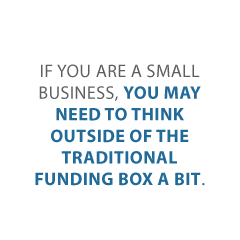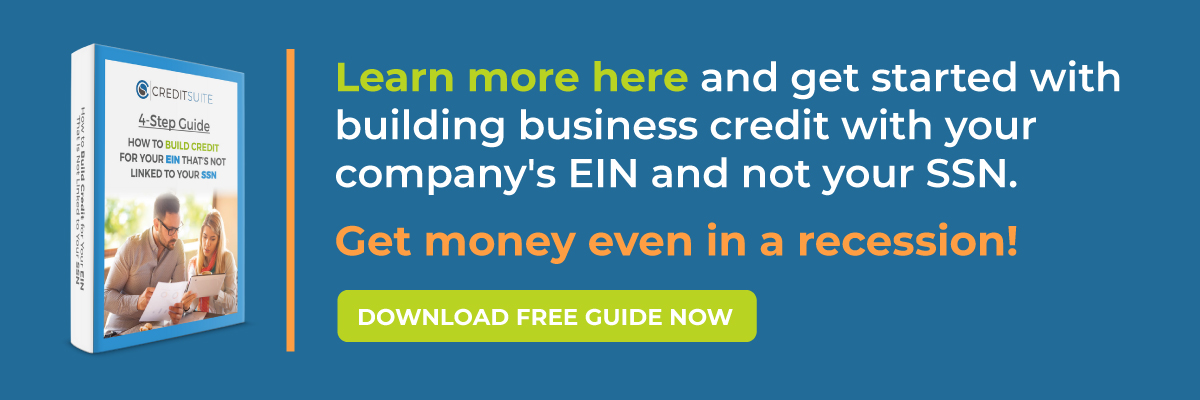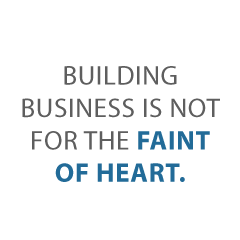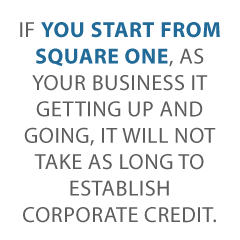The key to building business successfully is to set your business up for success in the beginning. Everyone knows that the key to building anything strong is to have a solid foundation, and the same is true of building a business.
Building Business Means Setting Up a Strong Foundation and Following Through
No one wants to go back to the beginning to build a foundation. It is always best to take the extra time to build a solid foundation on the front end. That usually takes some extra work and more than a few extra steps. While it’s true that building business is not for the faint of heart, this extra work is always worth it. Here is how to begin setting up your business for success.
Building Business: It’s all in the Plan
Not only is a business plan necessary when it comes to getting business loans, but it is necessary to the day to day operations of your business as well. Virtually all successful entrepreneurs will tell you that a major key to success is to plan to work and work the plan.
Most traditional lenders are going to need to see a business plan as part of the loan application process. Truthfully, it’s best to hire a professional business plan writer if possible. They can work with you to get all the necessary information and put it together in the traditional format.
If you cannot hire a business plan writer however, there other options. The Small Business Administration offers a template, and your local small business development center may also be able to help.

Check out our best webinar with its trustworthy list of seven vendors to help you build business credit.
For a business plan to be taken seriously by a lender, it needs to include the following:
A Strong Opening
An Executive Summary
This is a complete summary of the business idea.
Description
The description goes into further detail than the summary, describing the business. This is where you work to build excitement about your business.
Strategies
Layout your plan for getting started. Do you have a marketing plan, area in mind for location, or idea of how many employees you will start with? What is your ramp up plan?
Market Research
Market Analysis
This actually includes two parts. All that market research you did goes here:
Analysis of audience
What need will your business fill, and for who? Are you a child care facility filling a need for affordable child care for working moms? Are you an eatery filling a need for a lunch spot for those working downtown? How will your business fill the need? All of that information goes in this section.
Competitive Analysis
Is there already a business working to fill this need? Is there room for more? How do you plan to compete with them?
If you are not a new business, this will be a market analysis that supports your need for funding, or that shows your business is strong and growing.
The Plan
Plan for Design and Development
How is all of this going to play out, from start to finish. What steps are you going to take? This is more detailed than your strategies section.
Plan for Operation and Management
Who will own or does own the business and who will run or currently runs it from day to day. This could be as simple as stating that you are the sole owner and operator, or as complicated as laying out a complete partnership plan or board or directors’ format. It just depends on how your business works.
Financials
Financial Information
This section includes current financials, projections, and a budget plan for the loan funds you are applying for. Lenders need to see that you know how to handle the funds you get, and that you have a plan to pay them back.
Working the Plan
Don’t fall into the trap of thinking the official business plan is only for lenders to help you get loan approval. It isn’t. Your business plan should be a useable, practical tool that you can follow and refer back to. That is key to building business. Are sales down? Refer to your plan. Struggling with cash flow? What does the plan say? Work the plan you worked so hard on and trust the process. Also, remember to revisit the plan occasionally even if things are going well to look for ways to improve it, or adjust it if necessary.
Building Business: Licenses
Do you need a business license? What type of license do you need? Ask yourself these questions and find the answers to begin building business on a solid foundation.
Which Types of Business Licenses Do You Need?
If a federal agency regulates your business activities, you will need a federal license. The Small Business Administration lists the following industries as needing a federal license.
-
- Agriculture
- Alcoholic beverages
- Aviation
- Firearms, ammunition, and explosives
- Fish and wildlife
- Commercial fisheries
- Maritime transportation
- Mining and drilling
- Nuclear energy
- Radio and television broadcasting
- Transportation and logistics
The SBA also has a wealth of other information you need to know for starting your business, from help writing a business plan to finding funding.

Check out our best webinar with its trustworthy list of seven vendors to help you build business credit.
Building Business: What Funding Options are Available
There are a number of funding options available to help you when building business. Which one you choose will depend on a number of variables. It’s likely the best option will be some combination of the many possibilities, including how fundable your business is. We break them down for you below.
Traditional Term Loans
These are the loans from traditional lenders such as banks and credit unions. As a business, your business credit score can help you get some types of funding even if your personal score isn’t awesome. That isn’t necessarily the case with this type of funding however.
With a traditional lender term loan, you are almost always going to have to give a personal guarantee. This means they will check your personal credit. You will need a personal credit score of 700 or higher to gain approval usually, with the best terms and rates coming at 750 or higher.
Of all of the available business funding types, this is the hardest to get, but is also typically the option with the lowest interest rates and most reasonable terms.
SBA Loans
These are traditional bank loans, but they have a guarantee from the federal government. The Small Business Administration works with lenders to offer small business loans that they may not be able to get otherwise based on their credit history. Because of the government guarantee, lenders are able to relax a little on the personal credit score requirements.
In fact, it is possible to get an SBA micro-loan with a personal credit score between 620 and 640. These are very small loans, up to $50,000. Personal collateral is also usually a requirement.
The trade-off with SBA loans is that the application process is long and involved.
Business Line of Credit
This is basically the traditional lender’s version of a business credit card. The credit is revolving, meaning you only pay back what you use, just like a credit card. However, rates are typically much better than a credit card. The application and approval process is similar to that of a traditional term loan.
If you need revolving credit and can qualify for a term loan, this is a good option. It is great for bridging cash gaps and covering short term expenses without the high credit card interest rates.
There are no cash back rewards or loyalty points. This makes some business owners prefer business credit cards despite higher interest rates.
Invoice Factoring
If you are an established business with accounts receivable, then you might consider invoice factoring. This is where the lender buys your outstanding invoices at a premium, and then collects the full amount themselves. You get cash right away, without waiting for your customers to pay the invoices.
This is a good option if you need cash fast. It can also work if you do not qualify for other funding types. The interest rate varies based on the age of the receivables.
Non-Traditional Lenders
These are private lenders, not traditional banks and credit unions, that offer terms loans. Usually they operate online. The difference between these and traditional lenders is that the loans have looser approval requirement and a much faster application process. Most often you can simply apply online, get approval in as little as 24 hours, and the funds are in your account within 24 to 48 hours after approval.
These are an option if your personal credit isn’t terrible and you need money quickly.

Check out our best webinar with its trustworthy list of seven vendors to help you build business credit.
Crowdfunding
Crowdfunding is a newer option for finding investors. While the average Joe that wants to start a business needs funding, it is not always possible to find one or two large investors. With crowdfunding, you can literally have a crowd of investors fund your business in $5 and $10 increments.
There are many crowdfunding sites, but Indiegogo and Kickstarter are the most popular. The platforms are similar but there are some important differences. The most obvious is the timing of when you actually receive the funds that other invest in your company.
Find out more about each option here.
Grants
These are typically offered by professional organizations. There are some government grants available also. Competition can be stiff, but they are definitely worth applying for if you think you may qualify.
While requirements vary from grant to grant, and most are only awarded to a certain number of recipients, this is an option is worth looking into if you fall into one of these basic categories.
- Women owned business
- Minority owned business
- Businesses run by veterans
- Businesses in low income areas
There are also some corporations that offer grants in a contest format that do not require much other than that you meet the corporation’s definition of a small business and win the contest.
Business Credit Cards
These get a bad rap, but in lieu of another option, they aren’t a bad option. The draw is that they are available to most, even if their credit score that isn’t awesome. The catch is, the lower the credit score, the higher the interest rate. Also, there are limits on how low they will go with a credit score.
However, this is one type of funding that most of the general public is eligible for at any given time. They do a credit check, but your credit doesn’t have to be as high as it would be to gain approval for a traditional loan.
The downside of business credit cards is that they typically have a high interest rate. The upside is that many of them offer rewards in the form of cash or points that can be helpful.
Building Business: Marketing
Once you have your foundation set, you have to actually build up the business. That means getting others to buy whatever you are selling. Marketing is a term used for getting your product and service out there for others to see.
The number one beginner tip for marketing is to know who you are marketing to. You need to know what types of people will be buying your product so that you know how to convince them they need it. This step was probably taken care of in the marketing section of your business plan.
How you market will vary based on your budget, but these days social media marketing is huge. It’s a lower cost option than traditional television and news print, yet highly effective. If you can get just one post to go viral, you’ve done something. Get people talking about your product on social media and your marketing could basically be done for you, depending on what you are selling.
Of course, there is still a place for, and even a need for, traditional marketing when building business. Generally speaking, the best bet is to hire a professional to handle all aspects of marketing.
Building Business: Networking
This is an aspect of building business that so many do not really think about until after the fact. It can have a huge impact though. Of course, these days, as with marketing, much networking is done online through social media channels. There is something to be said for face to face connections however.
While much of your business may be run online, limiting face to face interaction, take some time to consider ways to connect locally. There could be those that need your services or product right in your area. Try joining your local chamber of commerce. They typically have events like business after hours that support this type of networking.
Building Business Isn’t Hard, but it Does Take Work
Building a successful business takes a lot of hard work and a lot of luck. Things can go wrong, even if you do everything right. You have to have a business plan, find funding, nail marketing, and work at networking. However, if you set yourself up for success in the beginning, work hard, and don’t lose momentum, you may end up with something fabulous.
The post Building Business Takes a Lot of Hard Work, but it Isn’t as Hard as You May Think appeared first on Credit Suite.












